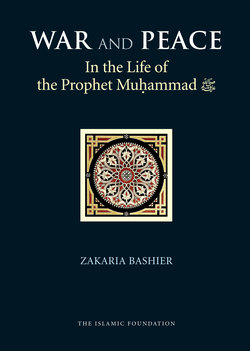Читать книгу War and Peace in the Life of the Prophet Muhammad - Zakaria Bashier - Страница 7
На сайте Литреса книга снята с продажи.
ОглавлениеAuthor’s Introduction
One of the major charges pressed against Islam is that it is a violent religion which was spread by the sword. Quite a few of the orientalists of old and new have pressed this charge to its extreme limits, in every field of their study of Islam, and it has now been given new vogue and momentum after the sorrowful events of September 11.
The orientalists claim that what had been a peaceful and dovish Islam, in its initial Makkan phase, had suddenly become aggressive and power-seeking, when it assumed statehood in its Madīnan Phase. The Prophet (peace be upon him) himself was accused of being inconsistent in his practices in Madīnah with what he used to preach in Makkah about tolerance and freedom of religious belief, and that there is no compulsion in religion.
Be that as it may, some recent studies of this topic appeared which tried to interpret this change in the course of Islam – i.e. from being peaceful and tolerant in Makkah, to being violent and aggressive in Madīnah – by making use of the concept of Qur’ānic verses which were abrogated by Allah, Himself. It is alleged, in these recent studies, that the early Makkan Qur’ānic verses calling for religious tolerance and peaceful coexistence with the adherents of other religious faiths, especially with the People of the Book, were abrogated by the so-called verses of the sword of Sūrah al-Tawbah (Repentance), i.e. verses numbers 5 and 29.
Then when the sacred months are drawn away, slay the idolaters wherever you find them; and take them, and confine them, and lie in wait for them at every place of ambush. But if they repent, and perform the prayer, and pay zakāh (alms), then let them go their way. [al-Tawbah 9:5]
Fight those who believe not in God and the Last Day, and do not forbid what God and His Messenger have forbidden, such men as practise not the religion of truth, being of those who have been given the Book, until they pay jizyah with willing submission, and feel themselves subdued. [al-Tawbah 9:29]
This reading of the situation, which inevitably depicts Islam as a hawkish, violent religion, seems to me to be plainly mistaken. The basic position of Islam is that religious convictions can only be disseminated by means of valid arguments and persuasive proofs. No man can be made to believe sincerely in any ideas or theories through compulsion or force. For a coerced person may pretend to believe under the force of fear and intimidation, but that is not genuine faith, since it will be forsaken at the earliest chance that freedom of thought presents itself.
The theory put forward in this study [War and Peace in the life of the Prophet Muḥammad (peace be upon him)] is that peace and peaceful coexistence with people of other faiths is the rule and custom in Islamic sharīʿah and Islamic way of life. Islam resorts to war only when it is compelled to defend itself against outside aggression. Almost all the historic wars waged by Islam can be construed as being just wars launched in self-defense, or against tyrant rulers and regimes under which men, women and children were oppressed and made powerless, be they Muslim or non-Muslim. Especially, war is construed as legitimate against tyrants and dictators who prevent the right of man to worship God Almighty freely and without fear or intimidation. It does not matter in Islam which religion these oppressed men, women and children are professing. They do not have to be Muslims; they could be Jews or Christians or followers of any other religious denomination, especially if it is deemed to be divinely revealed.
I started writing this manuscript in the summer of 1990, when I was visiting the Islamic Foundation, Markfield. But before I finished it, I had to return to Khartoum.
As life in Khartoum was so hectic and chaotic at that time, I could not resume work on this study for many years (more than seven years altogether). In 1997, I was appointed as Vice-Chancellor of Juba University, and as that was the first and only appointment I could secure under the National Salvation Government (NSG) of al-Bashier, I thought I could not afford to fail or underachieve. So I devoted all my energies to the new post and new challenge. Not only had the manuscript of the present study suffered more delay, but I was so dispirited and exhausted that I pondered giving up the whole project of finishing the book. Then my term of office as Vice-Chancellor of Juba university was terminated and I found myself jobless in Khartoum. As I was hard pressed financially, I had to look for a job outside the country. When I obtained a job as an expert in academic planning at the University of Qatar, I was too pleased to take it. That meant more delays in the writing and editing of this manuscript, which became the longest manuscript ever to remain in my hands. Every task and every achievement has a set and ordained time during which it would be completed (Wa Li Kulli Ajalin Kitāb).
Subḥānaka Allāhumma wa biḥamdika, Ash-hadu an lā ilāha illā anta. Astaghfiruka wa Atūbu ilayk! Wa uṣallī wa usallim ʿalā sayyidinā Muḥammad taslīman kathīran. Wa’l-ḥamdu lillāhi Rabbi’l-‘Ālamīn.
| 30th August 2004 | Zakaria Bashier Markfield Institute of Higher Education Markfield, Leicestershire, UK. |
